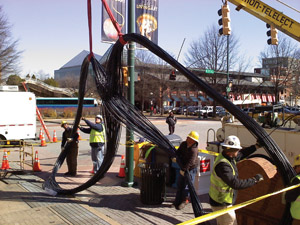
Fast, affordable Internet access for all.

The Commission will look for opportunities to enhance Internet access competition. One obvious candidate for close examination was raised in Judge Silberman’s separate opinion, namely legal restrictions on the ability of cities and towns to offer broadband services to consumers in their communities.The FCC has a history of encouraging states not to pass such laws (Commissioner Clyburn, previous FCC Chair, former Commissioner Copps) and the National Broadband Plan made recommendation 8.19: "Congress should make clear that Tribal, state, regional and local governments can build broadband networks." Even if communities choose not to build their own networks, having that capacity changes the dynamic of the big cable and telephone companies - something Franklin D. Roosevelt described as the "birch rod" in the cupboard (regarding municipal electricity):
But on the other hand the very fact that a community can, by vote of the electorate, create a yardstick of its own, will, in most cases, guarantee good service and low rates to its population.

Even though the Kansas cable lobby have temporarily retracted their competition-killing telecom bill, we still want to highlight the benefits of preserving full home rule, local authority by focusing on a number of communities, including Chanute, Ottawa, and Erie.
Chanute
We have reported on Chanute's municipal network for years. The community leveraged its electric utility assets and incrementally built an extensive publicly owned gigabit fiber network. Over several decades, the community expanded its network to serve schools, libraries, local government, and businesses. Chanute took advantage of every opportunity and created a valuable asset with no borrowing or bonding.
Several business, including Spirit AeroSystems, chose to locate in Chanute because of its incredible fiber network. Spirit brought approximately 150 new jobs. The network also retained jobs when incumbents refused to provide needed upgrades to local businesses. Rather than leave town, the businesses connected to the City's network and increased their productivity.
Former City Manager J.D. Lester referred to municipal broadband as “the great equalizer for Rural America,” saying: “You don’t have to live in Kansas City to work there.” (See our case study Chanute's Gig: One Rural Kansas Community's Tradition of Innovation Led to A Gigabit and Ubiquitous Wireless Coverage [PDF])
Kids in Chanute have access to connectivity other schools can only dream about. The local community college has expanded its distance learning program with higher capacity broadband. Free Wi-Fi hotspots are all over town; money otherwise sent to distant providers stays in the community. Chanute has invested in a WiMAX wireless system that serves public safety all over the region, not only in town. Their other utilities use the network for automatic metering and SCADA applications, saving energy and allowing customers the chance to reduce utility bills.
That's a lobby group with members such as Comcast, Cox, Eagle Communications, and Time Warner Cable. The bill was introduced this week, referred to the Committee on Commerce, and scheduled for discussion for Tuesday of next week.That hearing will now be delayed as the cable lobbyists strategize on a bill that less transparently serves only their interests. As usual, we see the cable lobbyists claiming that municipal networks use taxpayer dollars, despite the reality that most do not. Much of what I see in Kansas points to Time Warner Cable being behind this - a lame attempt to stop Google Fiber using lobbying power rather than innovating and investing. However, the bill has tremendously negative implications for rural Kansas because local governments are often the only entities that care if their communities have the Internet access they need in the modern economy. It stretches credulity to think Kansas would pass a bill that would prevent Google from expanding its network in the region.
encourage the development and widespread use of technological advances in providing video, telecommunications and broadband services at competitive rates; and ensure that video, telecommunications and broadband services are each provided within a consistent, comprehensive and nondiscriminatory federal, state and local government framework.Yet the bill does nothing but discourage investment, with no explanation of how prohibiting some approaches will lead to more investment or better services. It does not enable any new business models, rather it outlaws one possible source of competition for existing providers. The bill contains what will appear to the untrained eye to be an exemption for unserved areas. However, the language is hollow and will have no effect in protecting those who have no access from the impact of this bill. The first problem is the definition of unserved. A proper definition of unserved would involve whether the identified area has access to a connection meeting the FCC's minimum broadband definition delivered by DSL, cable, fiber-optic, fixed wireless or the like. These technologies are all capable of delivering such access. However the bill also includes mobile wireless and, incredibly, satellite access. As we have noted on many occasions, the technical limits of satellite technology render it unfit to be called broadband, even if it can deliver a specific amount of Mbps. Satellite just does not allow the rapid two-way transmitting of information common to modern Internet applications.

 The desire to focus on long term investments rather than rapidly evolving services is a natural reaction given the historic role of local governments in long term infrastructure investments. Fiber certainly fits in that description and as many have noted, the comparison to roads is apt.
The desire to focus on long term investments rather than rapidly evolving services is a natural reaction given the historic role of local governments in long term infrastructure investments. Fiber certainly fits in that description and as many have noted, the comparison to roads is apt.